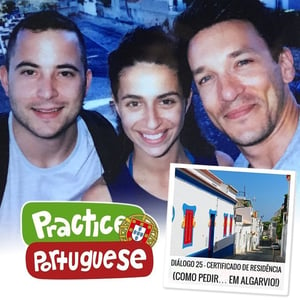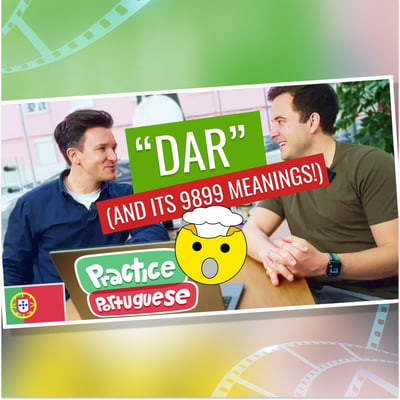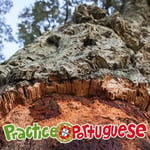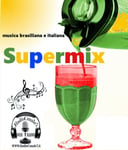1
00:00:01,702 –> 00:00:02,581
Joel: Olá, Rui!
{{Joel: Hi, Rui!}}
2
00:00:02,581 –> 00:00:05,662
Rui: Olá, Joel e olá, Eliana!
{{Rui: Hi, Joel and hi, Eliana!}}
3
00:00:05,662 –> 00:00:06,591
Eliana: Olá!
{{Eliana: Hi!}}
4
00:00:06,591 –> 00:00:10,366
R: Hoje temos uma convidada, que foi a minha amiga Eliana,
{{R: Today we have a guest, my friend Eliana,}}
5
00:00:10,366 –> 00:00:14,754
que nos ajudou a gravar o episódio que vocês ouviram, o episódio passado no Algarve,
{{who helped us record the episode you heard, the episode in Algarve,}}
6
00:00:14,754 –> 00:00:16,517
e a Eliana é do Algarve.
{{and Eliana is from Algarve.}}
7
00:00:16,517 –> 00:00:19,785
E: É verdade. Sou uma algarvia marafada.
{{E: That’s true. I’m a crazy Algarvian.}}
8
00:00:19,785 –> 00:00:22,840
R: Marafada. Portanto, a pronúncia que ouviram é genuína.
{{R: Crazy. So, the accent you heard is genuine.}}
9
00:00:22,840 –> 00:00:25,927
E nós decidimos, agora no fim do episódio,
{{And we decided, now, at the end of the episode,}}
10
00:00:25,927 –> 00:00:29,641
perguntar-lhe algumas coisas relacionadas com o vocabulário
{{to ask her a few things about the vocabulary}}
11
00:00:29,641 –> 00:00:33,927
que é típico lá de baixo e que não se ouve aqui no meio, não é?
{{which is typical from down there and isn’t heard here in central Portugal, right?}}
12
00:00:33,927 –> 00:00:34,642
E: É verdade.
{{R: That’s true.}}
13
00:00:34,642 –> 00:00:38,026
J: Sim, há muitas coisas no episódio que eu não entendi. Então…
{{J: Yes, there are lots of things in the episode that I didn’t understand. So…}}
14
00:00:38,026 –> 00:00:38,665
R: Pois.
{{R: Right.}}
15
00:00:38,665 –> 00:00:40,022
J: …Tenho algumas perguntas.
{{J: …I have some questions.}}
16
00:00:40,022 –> 00:00:42,740
R: Tu, provavelmente, houve muitas que não entendeste, não é?
{{R: You probably didn’t understand a lot of it, right?}}
17
00:00:42,740 –> 00:00:45,116
J: Sim! Tal como os membros, os nossos membros,
{{J: Right! Just like our members,}}
18
00:00:45,116 –> 00:00:48,394
acho que não entendi pelo menos metade do episódio.
{{I think I couldn’t understand at least half of the episode.}}
19
00:00:48,394 –> 00:00:51,407
Então, vamos tentar clarificar algumas… Clarificar?
{{So, we’ll try to clarify a few… ‘Clarificar’ [clarify]?}}
20
00:00:51,407 –> 00:00:52,707
R: Sim, clarificar.
{{R: Yes, ‘clarificar’.}}
21
00:00:52,707 –> 00:00:54,191
J: Esclarecer algumas coisas.
{{J: To explain a few things.}}
22
00:00:54,191 –> 00:00:56,224
E: São ambas válidas.
{{E: Both (words) are valid.}}
23
00:00:56,224 –> 00:00:58,781
R: Eliana, uma coisa que eu reparei que vocês fazem muito
{{R: Eliana, one thing I noticed that you do a lot}}
24
00:00:58,781 –> 00:01:01,895
é os… o ‘ão’, vocês cortam em ‘ã’.
{{is the… the ‘ão’ sound, you cut it off in ‘ã’.}}
25
00:01:01,895 –> 00:01:04,172
“Funcionária: Mas é o sistema que manda, não sou eu.”
{{“Worker: But these are the system’s rules, not mine.”}}
26
00:01:04,172 –> 00:01:06,203
“F: Ó Filipe, tu não me ouves a berrar por ti?”
{{W: Filipe, didn’t you hear me calling for you?}}
27
00:01:06,203 –> 00:01:06,978
R: O ‘nã sê’…
{{R: The ‘nã sê’ [‘I dunno’]…}}
28
00:01:06,978 –> 00:01:09,666
E: ‘Nã sê’, ya. Nã sei…
{{E: ‘Nã sê’, yeah. ‘I dunno’…}}
29
00:01:09,666 –> 00:01:10,898
J: ‘Nã sê’?
{{J: ‘Nã sê’?}}
30
00:01:10,898 –> 00:01:12,199
R: Nã sê.
{{R: ‘Nã sê’.}}
31
00:01:12,199 –> 00:01:15,720
E: ‘Nã gosto’, ‘nã quero’… O ‘nã’ nota-se mais, sim.
{{E: ‘I don’ like it’, ‘I don’t want it’… The ‘nã’ is more noticeable, yes.}}
32
00:01:15,720 –> 00:01:17,128
R: Em vez de ‘não sei’…
{{R: Instead of ‘I don’t know’…}}
33
00:01:17,128 –> 00:01:17,760
E: Nã sê.
{{E: I dunno.}}
34
00:01:17,760 –> 00:01:18,355
R: Nã sê.
{{R: I dunno.}}
35
00:01:18,355 –> 00:01:19,081
J: Nã sê.
{{J: I dunno.}}
36
00:01:19,081 –> 00:01:20,205
R: Nã quero…
{{R: I don’t want it…}}
37
00:01:20,205 –> 00:01:23,232
E: Nós comemos as últimas vogais das palavras.
{{E: We eat the last vowels of the words.}}
38
00:01:23,232 –> 00:01:24,723
J: E mudam. Não é só comer, é…
{{J: And you change them. You don’t just eat them; you…}}
39
00:01:24,723 –> 00:01:26,014
E: É. De forma geral…
{{E: Right. In general…}}
40
00:01:26,014 –> 00:01:26,940
J: …É comer outras e…
{{J: …You eat some and…}}
41
00:01:26,940 –> 00:01:28,048
R: Mudam um bocadinho o som.
{{R: They change the sound a little bit.}}
42
00:01:28,048 –> 00:01:28,609
J: …mudar outras.
{{J: …you change others.}}
43
00:01:28,609 –> 00:01:29,250
E: Sim.
{{E: Yes.}}
44
00:01:29,250 –> 00:01:33,164
R: Vocês dizem, por exemplo – mas já me disseste aqui, quando nós estávamos a gravar,
{{R: For example, you say – but you’ve already told me, when we were recording,}}
45
00:01:33,164 –> 00:01:35,464
que não é bem da tua zona, mas o ‘môce’ (moço)…
{{that it’s not quite from your area, but the ‘môce’ (boy)…}}
46
00:01:35,464 –> 00:01:38,574
E: É. O ‘môce’ é do sotavento algarvio.
{{E: Right. ‘Môce’ is from Eastern Algarve.}}
47
00:01:38,574 –> 00:01:41,284
“F: Ó Filipe, anda cá, môce (moço), que está aqui um senhor”
{{“W: Filipe, come here, boy, because there’s a man here”}}
48
00:01:41,284 –> 00:01:44,633
“precisando do Certificado de Registo e já está na hora da minha bucha [do meu lanche]!”
{{“who needs a Registration Certificate and it’s already time for my snack break!”}}
49
00:01:44,633 –> 00:01:47,831
J: Isso é uma palavra que eu sabia que os brasileiros usavam, não é?
{{J: That’s a word that I knew Brazilian people used, right?}}
50
00:01:47,831 –> 00:01:48,540
R: Moço?
{{R: ‘Moço’ [boy]?}}
51
00:01:48,540 –> 00:01:52,047
J: Então, significa que é uma palavra antiga do português
{{J: So, does that mean it’s an ancient Portuguese word}}
52
00:01:52,047 –> 00:01:54,413
que ainda se mantém em algumas…
{{which is still used in some…}}
53
00:01:54,413 –> 00:01:59,450
R: Não, ‘moço’ existe – não usamos muito -, mas eles usam ‘môce’.
{{R: No, ‘moço’ exists – although we don’t use it much -, but they use ‘môce’.}}
54
00:01:59,450 –> 00:02:00,462
R: Mas estavas a dizer…?
{{R: But you were saying…?}}
55
00:02:00,462 –> 00:02:03,513
E: É. Eles usam quase como interjeição. É tipo,
{{E: Right. They use it almost like an interjection. It’s like,}}
56
00:02:03,513 –> 00:02:05,743
“Môce, então, não vens aqui?”
{{“Hey, boy, you’re not coming here?”}}
57
00:02:05,743 –> 00:02:06,580
R: “Ó tu”.
{{R: “Hey, you”.}}
58
00:02:06,580 –> 00:02:09,352
E: “Tu”… É a referir-se a alguém.
{{E: “You”… It’s referring to someone.}}
59
00:02:09,352 –> 00:02:14,308
Na minha zona, essa interjeição, de uma forma um bocado mais pejorativa,
{{In my area, that interjection, in a bit more offensive way,}}
60
00:02:14,308 –> 00:02:15,956
é substituída por ‘deb’.
{{is replaced by ‘deb’.}}
61
00:02:15,956 –> 00:02:16,779
J: Deb?
{{J: Deb?}}
62
00:02:16,779 –> 00:02:18,561
R: Deb, que vem de…?
{{R: Deb, which comes from…?}}
63
00:02:18,561 –> 00:02:21,107
E: De ‘diabo’. Vem de ‘diabo’, ainda que, hoje em dia,
{{E: From ‘devil’. It comes from ‘devil’, even though, nowadays,}}
64
00:02:21,107 –> 00:02:24,279
as pessoas que usam essa expressão não tenham noção que isso vem de ‘diabo’.
{{the people who use that expression are not aware that it comes from ‘devil’.}}
65
00:02:24,279 –> 00:02:27,304
E nós dizemos, “Que é isso, deb? Não faças isso!”
{{And we say, “What’s that, deb? Don’t do that!”}}
66
00:02:27,304 –> 00:02:28,775
J: E essas duas interjeições…
{{J: And those two interjections…}}
67
00:02:28,775 –> 00:02:29,712
R: É tipo o ‘hey’, em inglês.
{{R: It’s like ‘hey’, in English.}}
68
00:02:29,712 –> 00:02:33,897
J: OK. E não muda com quem estás a falar ou quem está a falar?
{{J: OK. And doesn’t it change according to who you’re talking to or who’s speaking?}}
69
00:02:33,897 –> 00:02:35,414
E: Sim, sim, muda. Não usas…
{{E: Yes, yes, it changes. You don’t use…}}
70
00:02:35,414 –> 00:02:36,359
J: Muda o género?
{{J: Does it change gender?}}
71
00:02:36,359 –> 00:02:39,231
E: Não, não muda de género, mas muda no registo.
{{E: No, it doesn’t change gender, but it changes according to the language register.}}
72
00:02:39,231 –> 00:02:42,539
Isto só é usado num registo descontraído, em que conheces as pessoas e estás na boa…
{{This is only used in a relaxed register, when you know people and you’re comfortable…}}
73
00:02:42,539 –> 00:02:43,406
J: Informalmente.
{{J: Informally.}}
74
00:02:43,406 –> 00:02:45,444
E: Informal, completamente informal.
{{E: Informal, completely informal.}}
75
00:02:45,444 –> 00:02:48,445
R: Vocês conseguem reparar que a Eliana tem um bocadinho de pronúncia.
{{R: You can tell that Eliana has a little bit of an accent.}}
76
00:02:48,445 –> 00:02:49,252
E: Só um bocadinho.
{{E: Just a little bit.}}
77
00:02:49,252 –> 00:02:49,890
R: Só um bocadinho.
{{R: Just a little bit.}}
78
00:02:49,890 –> 00:02:53,174
J: No episódio, estava exagerado… exagerada, a pronúncia.
{{J: In the episode, the accent was exaggerate… exaggerated.}}
79
00:02:53,174 –> 00:02:58,312
E: Sim, tem que se fazer… enfatizar ali para dar aquela genuinidade
{{E: Sure, you have to… emphasize it there to bring that genuineness}}
80
00:02:58,312 –> 00:03:04,349
que os membros podem encontrar se forem ali àquelas aldeias mais recônditas do Algarve,
{{that members might find if they visit the more rural villages in Algarve,}}
81
00:03:04,349 –> 00:03:07,272
não aquelas que fiquem mais ao pé da praia,
{{not the ones closer to the beaches,}}
82
00:03:07,272 –> 00:03:08,618
mas aquelas mais escondidas lá no meio da serra…
{{but the ones that are hidden in the hills}}
83
00:03:08,618 –> 00:03:09,717
R: Pois, menos turísticas.
{{R: Right, less touristic.}}
84
00:03:09,717 –> 00:03:14,399
Este episódio foi escrito porque temos muitos membros que se mudaram para o Algarve.
{{This episode was written because we have a lot of members who moved to Algarve.}}
85
00:03:14,399 –> 00:03:17,097
Como todas as pessoas, querem viver no Algarve
{{Like all people, they wanted to live in Algarve}}
86
00:03:17,097 –> 00:03:21,342
e eles, reformados, compraram uma casa no Algarve e, portanto,
{{and so, since they’re retired, they bought a house in Algarve and, so,}}
87
00:03:21,342 –> 00:03:24,924
tínhamos alguns pedidos de membros que queriam ouvir um pouco
{{we had some requests from members who wanted to listen to it}}
88
00:03:24,924 –> 00:03:29,354
e que explicássemos um pouco a pronúncia, que é diferente da pronúncia que se ouve…
{{and wanted us to explain a bit of the pronunciation, which is different from the pronunciation you hear…}}
89
00:03:29,354 –> 00:03:31,797
J: E as características de que estamos a falar…
{{J: And these features we’re talking about…}}
90
00:03:31,797 –> 00:03:35,669
A nova geração… O dialeto é um pouco mais padrão?
{{The new generation… Is the dialect a bit more standard now?}}
91
00:03:35,669 –> 00:03:38,479
E: Sim, é mais fácil de compreender,
{{E: Yes, it’s easier to understand,}}
92
00:03:38,479 –> 00:03:41,198
porque aquelas expressões tradicionais foram-se perdendo.
{{because the more traditional expressions are being lost.}}
93
00:03:41,198 –> 00:03:44,678
Mas há algumas que se mantêm.
{{But some are still in use.}}
94
00:03:44,678 –> 00:03:46,750
O ‘môce’, hoje em dia, toda a gente usa;
{{Everyone uses ‘môce’, nowadays;}}
95
00:03:46,750 –> 00:03:49,236
o ‘deb’, lá do meu lado, também toda a gente usa.
{{everyone also uses ‘deb’ in my area.}}
96
00:03:49,236 –> 00:03:52,506
O ‘da balada’… “Vais da balada?” “Olha, vou da balada!”.
{{‘Da balada’ [leaving]… “Are you leaving?” “Look, I’m leaving!”.}}
97
00:03:52,506 –> 00:03:52,961
R: ‘Abalar’, não é?
{{R: ‘Abalar’, right?}}
98
00:03:53,186 –> 00:03:53,998
J: Que é isso?
{{J: What’s that?}}
99
00:03:53,998 –> 00:03:55,735
R: ‘Abalar’ é ir embora.
{{R: ‘Abalar’ is to leave.}}
100
00:03:55,735 –> 00:03:56,310
E: Exato.
{{E: Exactly.}}
101
00:03:56,310 –> 00:03:58,089
J: Ah, ‘abalar’ é uma palavra?
{{J: Ah, ‘abalar’ is a word?}}
102
00:03:58,089 –> 00:04:00,673
R: ‘Abalar’, é um verbo. Tal como o ‘moço’,
{{R: ‘Abalar’, it’s a verb. Just like ‘moço’ [boy],}}
103
00:04:00,673 –> 00:04:03,892
são palavras que eu reconheço do nosso dicionário,
{{these are words that I recognize from our dictionary,}}
104
00:04:03,892 –> 00:04:08,304
só que eles usam-nas ou mais ou num contexto que nós não usamos.
{{but they either use them more or in a context where we don’t.}}
105
00:04:08,304 –> 00:04:10,545
Mas eu conheço o ‘abalar’, conheço o ‘moço’…
{{But I know ‘abalar’, I know ‘moço’…}}
106
00:04:10,545 –> 00:04:11,939
E: Como o ‘jogar’, por exemplo.
{{E: Like ‘jogar’ [to throw out], for example.}}
107
00:04:11,939 –> 00:04:13,868
R: Como o ‘jogar’, em vez do ‘deitar fora’…
{{R: Like ‘jogar’, instead of ‘deitar fora’ [to throw out]…}}
108
00:04:13,868 –> 00:04:15,479
J: Ou jogar fora.
{{J: Or ‘jogar fora’.}}
109
00:04:15,479 –> 00:04:15,850
E: Nós dizemos…
110
00:04:15,850 –> 00:04:16,300
R: Atirar…
{{R: ‘Atirar’ [to throw]…}}
111
00:04:16,300 –> 00:04:19,869
E: Sim, ou ‘atirar’. “Joga isso para aí”, “Olha, joguei fora”…
{{E: Yes, or ‘atirar’. ” Throw it there”, “Look, I threw it out”…}}
112
00:04:19,869 –> 00:04:20,475
R: “Joguei fora”…
{{R: “I threw it out”…}}
113
00:04:20,475 –> 00:04:22,639
J: OK. Em vez de ‘deitar fora’.
{{J: OK. Instead of ‘deitar fora’ [to throw out].}}
114
00:04:22,639 –> 00:04:23,142
R: Sim.
{{R: Yes.}}
115
00:04:23,142 –> 00:04:23,519
E: Exato.
{{E: Exactly.}}
116
00:04:23,519 –> 00:04:27,027
R: Depois, há expressões mais compostas, que algumas eu não conheço mesmo.
{{R: Then, there are some more complex expressions, and some of them I really don’t know.}}
117
00:04:27,027 –> 00:04:29,245
Por exemplo, “dou féte (feito) disse (disso)”.
{{For example, ‘dou féte (feito) disse (disso)’.}}
118
00:04:29,245 –> 00:04:31,283
E: Ah, ‘dou fête’! “Ê nã dou fête!”
{{E: Ah, ‘dou fête’! “Ê nã dou fête [I can’t handle it]!”}}
119
00:04:31,283 –> 00:04:31,777
R: ‘Nã dou fête’?
{{R: ‘Nã dou fête’?}}
120
00:04:31,777 –> 00:04:32,387
E: ‘Nã dou fête’.
{{E: ‘Nã dou fête’.}}
121
00:04:32,387 –> 00:04:35,257
“F: “Moço, eu não dou feito disso [não dou conta disso]!”, e eles tiveram que abalar.”
{{“W: “Boy, I can’t work with that!”, and they had to leave.}}
122
00:04:35,257 –> 00:04:36,125
R: Não dou conta?
{{R: ‘Não dou conta’ [I can’t deal with it]?}}
123
00:04:36,125 –> 00:04:37,754
E: É. É tipo não dar conta.
{{E: Right. It’s like not being able to deal with it.}}
124
00:04:37,754 –> 00:04:40,337
J: …separar palavras. Que é? Diz outra vez.
{{J: …separate the words. What is it? Say it again.}}
125
00:04:40,337 –> 00:04:43,483
E: ‘Não dou feito disso’.
{{E: ”Não dou feito disso’.}}
126
00:04:43,483 –> 00:04:45,343
J: ‘Dou’ é do verbo ‘dar’?
{{J: ‘Dou’ is form the verb ‘dar’ [to give]?}}
127
00:04:45,343 –> 00:04:45,981
E: Sim.
{{E: Yes.}}
128
00:04:45,981 –> 00:04:47,335
J: OK. ‘Não dou’…
{{J: OK: ‘Não dou’…}}
129
00:04:47,335 –> 00:04:48,121
R: ‘Feito’…
{{R: ‘Feito’…}}
130
00:04:48,121 –> 00:04:48,639
J: ‘Feito’…
{{J: ‘Feito’…}}
131
00:04:48,639 –> 00:04:51,385
R: ‘Disso’, mas depois, dito com pronúncia, é ‘féte’. ‘Fête’.
{{R: ‘Disso’, but then, said with the accent, is ‘féte’. ‘Fête’.}}
132
00:04:51,385 –> 00:04:52,264
E: ‘Nã dou fête disso’.
{{E: ‘Nã dou fête disso’.}}
133
00:04:52,264 –> 00:04:53,105
R: ‘Nã dou fête’.
{{R: ‘Nã dou fête’.}}
134
00:04:53,105 –> 00:04:56,089
E: ‘Nã dou fête disso’! É muita coisa, ‘nã dou fête’.
{{E: ‘Nã dou fête disso’! It’s a lot, ‘nã dou fête’ [I can’t handle it].}}
135
00:04:56,089 –> 00:05:00,469
R: Sim, não se preocupem, porque nós depois vamos dar-vos uma cábula com estas palavras.
{{R: Right, don’t worry, because we’ll give you a list with these words.}}
136
00:05:00,469 –> 00:05:02,520
Aliás, na verdade, eu escrevi este episódio…
{{In fact, actually, I wrote this episode…}}
137
00:05:02,520 –> 00:05:04,222
Como podem imaginar, eu não sou do Algarve.
{{As you can imagine, I’m not from Algarve.}}
138
00:05:04,222 –> 00:05:10,214
Tive que recorrer à Internet e recorri a um dicionário algarvio online.
{{I had to resort to the Internet and to an online Algarvian dictionary.}}
139
00:05:10,214 –> 00:05:13,109
Por isso é que consegui usar estas expressões.
{{That’s why I was able to use these expressions.}}
140
00:05:13,109 –> 00:05:14,911
Deixa-me ver aqui mais alguma coisa…
{{Let me see something else here…}}
141
00:05:14,911 –> 00:05:16,671
O ‘ó despôs’ (depois)…
{{The ‘ó despôs’ [later]…}}
142
00:05:16,675 –> 00:05:19,412
“Vizinha: Despôs (depois) da subida, viram à esquerda, descem a ladeira”
{{“Neighbour: ‘Despôs’ [After] going up, you turn left, go down the hill”}}
143
00:05:19,412 –> 00:05:22,654
“e a casa dela é mesmo de frente para o mercado, ao pé do quiosque.”
{{“and her house is right in front of the market, next to the kiosk.”}}
144
00:05:22,654 –> 00:05:26,487
E: “Ó despôs, olha, fui lá… e, olha, deixaram-me em paz.”
{{E: “Well, ‘despôs’ [then], look, I went there… and, well, they left me alone.”}}
145
00:05:26,487 –> 00:05:28,969
E: ‘Ó despôs’ é ‘e depois’.
{{E: ‘Ó despôs’ is ‘e depois’ [and then].}}
146
00:05:28,969 –> 00:05:29,872
R: E depois.
{{R: And then.}}
147
00:05:29,872 –> 00:05:30,866
J: ‘Despôs’.
{{J: ‘Despôs’.}}
148
00:05:30,866 –> 00:05:31,493
E: ‘Ó despôs’.
{{E: ‘Ó despôs’.}}
149
00:05:31,493 –> 00:05:33,118
R: É ‘depois’. ‘E depois’…
{{R: It’s ‘depois’ [after; then]. ‘E depois’ [and then]…}}
150
00:05:33,118 –> 00:05:33,761
E: ‘E depois’…
{{E: And then…}}
151
00:05:33,761 –> 00:05:37,311
J: Mas ainda é escrito como ‘depois’, mas pronunciado ‘despôs’?
{{J: But is it still written like ‘depois’, but pronounced ‘despôs’?}}
152
00:05:37,311 –> 00:05:40,440
R: É. Isto na verdade é assim… É tudo falado.
{{R: Yes. This is actually… It’s all just spokeh.}}
153
00:05:40,440 –> 00:05:41,665
E: Exato.
{{E: Exactly.}}
154
00:05:41,665 –> 00:05:44,304
R: Na escrita, sabe-se que não é assim que se escreve,
{{R: In writing, we know that’s not how it’s written,}}
155
00:05:44,304 –> 00:05:47,732
mas isto é falado, é a nível de pronúncia, não é a nível de escrita.
{{but this is spoken, it’s about the pronunciation, not the writing.}}
156
00:05:47,732 –> 00:05:48,448
J: ‘Despôs’.
{{J: ‘Despôs’.}}
157
00:05:48,448 –> 00:05:51,330
E: Exato. A escrever, a gente sabe escrever bem.
{{E: Exactly. When it comes to writing, we know how to do it well.}}
158
00:05:51,910 –> 00:05:53,361
Falar é que ‘tá quieto!
{{But speaking is another story!}}
159
00:05:53,361 –> 00:05:57,050
R: Há uma altura no episódio que eu escrevi qualquer coisa como,
{{R: There’s a moment in the episode where I wrote something like,}}
160
00:05:57,050 –> 00:06:00,722
“Todas as pronúncias estão corretas e são consideradas corretas.”
{{“All pronunciations are correct and are considered correct.”}}
161
00:06:00,722 –> 00:06:05,233
O Instituto Camões considera que o português tem várias pronúncias
{{The Camões Institute considers that Portuguese has several accents}}
162
00:06:05,233 –> 00:06:07,207
e todas corretas, porque é isso mesmo, é…
{{and all of them are correct, because it’s exactly like that, it’s…}}
163
00:06:07,207 –> 00:06:11,575
Escrever é tudo igual; falado há muitas diferenças em Portugal.
{{The writing is all the same; but in speech, there are a lot of differences in Portugal.}}
164
00:06:11,575 –> 00:06:13,350
Não há nenhuma mais correta que a outra.
{{There’s not one that is more correct than the other.}}
165
00:06:13,350 –> 00:06:15,383
E: Eu costumo dizer que a língua é a expressão do povo.
{{E: I often say that language is the expression of the people.}}
166
00:06:15,383 –> 00:06:16,308
R: Exatamente.
{{R: Exactly.}}
167
00:06:16,308 –> 00:06:18,999
E: E então, aquilo que nós criamos é porque tem uma utilidade e…
{{E: And so, if we create something, it’s because it’s useful and…}}
168
00:06:18,999 –> 00:06:19,553
R: É isso mesmo.
{{R: That’s it.}}
169
00:06:19,553 –> 00:06:23,468
E: …se damos alguma entoação diferente, tem a ver com toda a história que vem atrás
{{E: …if we use a different inflection, it’s due to all the history behind us}}
170
00:06:23,468 –> 00:06:26,573
e com… e como eu te dizia, que no Algarve há muito aquelas expressões
{{and… and like I told you, in Algarve there a lot of expressions}}
171
00:06:26,573 –> 00:06:29,101
que vêm todas do mar, têm a ver com o contacto com o mar.
{{which are all related to the sea, have to do with our contact with the sea.}}
172
00:06:29,101 –> 00:06:30,561
É tudo do peixinho, disto, daquilo…
{{It’s all about the fish, about this or that…}}
173
00:06:30,561 –> 00:06:32,861
J: Qual foi aquela expressão do choco que tu disseste?
{{J: What was that expression about squid that you said?}}
174
00:06:32,861 –> 00:06:34,108
E: “Não vales um balde de chocos”.
{{E: “You’re not worth a bucket of squid”.}}
175
00:06:34,108 –> 00:06:37,051
R: “Não vales um balde de chocos”.
{{R: “You’re not worth a bucket of squid”.}}
176
00:06:37,430 –> 00:06:39,307
J: “You’re not worth a bucket of…”
{{J: “You’re not worth a bucket of…”}}
177
00:06:39,307 –> 00:06:40,632
E, J, R: “Squid”!
{{E, J, R: “Squid”!}}
178
00:06:41,753 –> 00:06:44,805
J: Adoro. Claro que tem a ver com o mar.
{{J: I love it. Of course it’s about the sea.}}
179
00:06:44,805 –> 00:06:48,633
R: Claro, e… Eu acho que o que a Eliana está a dizer é isso mesmo,
{{R: Of course, and… I think that what Eliana is trying to say is precisely that,}}
180
00:06:48,633 –> 00:06:51,564
é que as pronúncias revelam a cultura das terras
{{is that the accents reveal the culture of each place}}
181
00:06:51,564 –> 00:06:54,277
e se falássemos todos exatamente da mesma forma,
{{and if we all spoke in the exact same way,}}
182
00:06:54,277 –> 00:06:55,102
era um pouco estranho,
{{it would be a little weird,}}
183
00:06:55,102 –> 00:06:58,544
porque temos todos origens diferentes, raízes diferentes…
{{because we all have different origins, different roots…}}
184
00:06:58,544 –> 00:07:00,182
Vocês dizem muito o ‘fachavor’ (faz favor)…
{{You use ‘fachavor’ (please) a lot…}}
185
00:07:00,182 –> 00:07:03,690
“Funcionária: Boa tarde. O senhor tem que ir ali buscar uma senha vermelha, ‘fachavor’.”
{{“Worker: Good afternoon. Sir, you need to go over there and pull a red ticket, ‘fachavor’ [please].”}}
186
00:07:03,690 –> 00:07:04,486
E: ‘Fachavor’.
{{E: ‘Fachavor’.}}
187
00:07:04,486 –> 00:07:07,002
J: ‘Fachavor’ em vez de ‘faz favor’.
{{J: ‘Fachavor’ instead of ‘faz favor’ [please].}}
188
00:07:07,002 –> 00:07:10,677
R: Em vez de ‘faz favor’, juntam. ‘Tô vendo’ (estou a ver)…
{{R: Instead of ‘faz favor’, they join them together. ‘Tô vendo’ [I see]…}}
189
00:07:10,677 –> 00:07:13,857
“Funcionária: Tô vendo. E pretende ficar mais que 3 meses, é isso?”
{{“Worker: I see. And you intend to stay for longer than 3 months, is that it?”}}
190
00:07:13,857 –> 00:07:17,040
E: ‘Tô vendo’. Também usamos muito o gerúndio. ‘Tô vendo’, ‘tô fazendo’…
{{E: ‘Tô vendo’. We also use the present participle a lot. ‘Tô vendo’ [I’m seeing], ‘tô fazendo’ [I’m doing]…}}
191
00:07:17,040 –> 00:07:18,259
R: É verdade, boa.
{{R: That’s true, nice.}}
192
00:07:18,259 –> 00:07:18,742
J: É como os brasileiros.
{{J: It’s like Brazilians.}}
193
00:07:18,742 –> 00:07:20,246
E: “Entã’ nã’ ouves o que eu tô dezendo?”
{{E: “Aren’t you listening to what I’m saying?}}
194
00:07:20,246 –> 00:07:22,463
R: ‘Dezendo’ (dizendo), em vez de ‘a dizer’.
{{R: ‘Dezendo’, instead of ‘a dizer’ [saying].}}
195
00:07:22,463 –> 00:07:25,604
R: “Estou a dizer o que estou a fazer”…
{{R: “I’m saying what I’m doing”…}}
196
00:07:25,604 –> 00:07:26,905
Eles usam o gerúndio.
{{They use the present participle.}}
197
00:07:26,905 –> 00:07:29,971
E: Os alentejanos também o usam muito, por curiosidade.
{{E: People from Alentejo also use it a lot, as a curiosity.}}
198
00:07:29,971 –> 00:07:32,471
É uma coisa assim do sul do país,
{{It’s something from the south of the country,}}
199
00:07:32,471 –> 00:07:35,315
que acabou também, depois, por ser importado para o Brasil.
{{which also ended up being imported to Brazil.}}
200
00:07:35,315 –> 00:07:35,915
R: Sim.
{{R: Yes.}}
201
00:07:35,915 –> 00:07:38,222
E: Eles também usam muito o gerúndio dos verbos.
{{E: They also use the present participle of the verbs often.}}
202
00:07:38,222 –> 00:07:40,438
R: Dizem ‘cal é’, “Cal é o assunto?”…
{{R: You say ‘cal é’ [what is], “What is the subject?”…}}
203
00:07:40,438 –> 00:07:41,394
E: ‘Cal é’, sim.
{{E: ‘Cal é’, yes.}}
204
00:07:41,394 –> 00:07:41,966
R: ‘Cal é’.
{{R: ‘Cal é’.}}
205
00:07:41,966 –> 00:07:42,990
J: Em vez de ‘qual é’?
{{J: Instead of ‘qual é’ [what is]?}}
206
00:07:42,990 –> 00:07:46,719
E: ‘Cal é’. Exato. “Cal é que foi aquela coisa que tu me disseste ontem?”.
{{E: ‘Cal é’. Exactly. “What was that thing you told me yesterday?”.}}
207
00:07:46,719 –> 00:07:47,564
“Qual é que foi?”.
{{“What was it?”.}}
208
00:07:47,564 –> 00:07:47,871
J: ‘Cal é’.
{{J: ‘Cal é’.}}
209
00:07:47,871 –> 00:07:50,343
E: ‘Cal é’. “Cal é a tua? ‘Tás aí…”
{{E: ‘Cal é’. “What’s up with you? You…”}}
210
00:07:50,343 –> 00:07:51,371
‘O mê canito’ (meu cãozinho)…
{{‘O mê canito’ [my little dog; puppy]…}}
211
00:07:51,371 –> 00:07:51,888
R: ‘O canito’…
{{R: ‘O canito’…}}
212
00:07:51,888 –> 00:07:53,316
E: “O mê canito é lindo.”
{{E: “My little dog is beautiful.”}}
213
00:07:53,316 –> 00:07:56,172
“Empregada: Tem aí esses bolos, mas eu cá não aconselho.”
{{“Employee: There’s those cakes over there, but I don’t recommend them.”}}
214
00:07:56,172 –> 00:07:58,097
“Acho que vou dá-los ao meu canito [cãozinho].”
{{“I think I’ll give them to my puppy.”}}
215
00:07:58,097 –> 00:07:59,319
R: Mã’ chêa (mão-cheia)…
{{R: ‘Mã’ chêa’ (handful)…}}
216
00:07:59,319 –> 00:08:01,260
E: Uma mã’ chêa… Ai, a mã’ chêa é lindo.
{{E: A handful… Ai, ‘mã’ chêa’ is great.}}
217
00:08:01,260 –> 00:08:04,879
J: Espera, então, ‘canito’ é o que tu usaste para um cão, não é? Um cão pequeno.
{{J: Wait, so, ‘canito’ is what you used for a dog, right? A small dog.}}
218
00:08:04,879 –> 00:08:06,691
R: Não, é um nome carinhoso para cão.
{{R: No, it’s a sweet name for a dog.}}
219
00:08:06,691 –> 00:08:09,976
J: OK, mas tu disseste que vinha de ‘carinhoso’?
{{J: OK, but did you say it came from ‘carinhoso’ [affectionate]?}}
220
00:08:09,976 –> 00:08:14,211
E: É. É quase um diminutivo carinhoso para um cão.
{{E: Right. It’s almost like a sweet short name for a dog.}}
221
00:08:14,211 –> 00:08:14,817
J: ‘Canito’.
{{J: ‘Canito’.}}
222
00:08:14,817 –> 00:08:16,141
E: “Olha, que canito tão fofo!”
{{E: “Look, what a sweet ‘canito’ [little dog]!”}}
223
00:08:16,688 –> 00:08:17,934
R: E ‘mâ’ chêa’ (mão-cheia)?
{{R: What about ‘mâ’ chêa’ [handful]?}}
224
00:08:17,934 –> 00:08:20,824
“Empregada: Essa mã’ chêa (mão-cheia) de bolos foi o Joaquim que trouxe.”
{{“Employee: That handful of cakes was brought by Joaquim.”}}
225
00:08:20,824 –> 00:08:23,119
E: É uma mão cheia. ‘Mã chêa’.
{{E: It’s a handful. ‘Mã chêa’.}}
226
00:08:23,119 –> 00:08:26,555
R: Mã chêa. Uma mão-cheia de coisas, é uma quantidade boa.
{{R: ‘Mã chêa’. A handful of stuff, a good amount.}}
227
00:08:26,555 –> 00:08:27,565
E: “Tenho uma mã chêa de coisas para fazer.”
{{E: “I have a handful of things to do.”}}
228
00:08:27,565 –> 00:08:30,687
E: “Estou aqui, olha… Atabalhoada de coisas.”
{{E: “I’m here, well… Overwhelmed with things.”}}
229
00:08:30,687 –> 00:08:31,987
E: “Ai, uma grande porqueira (porcaria).”
{{E: “Oh, a big ‘porqueira’ [mess].”}}
230
00:08:31,987 –> 00:08:34,619
“Ai, ma’ que grande porqueira!”
{{“Oh, but wha’ a huge mess!”}}
231
00:08:34,619 –> 00:08:34,913
J: O que é?
{{J: What is it?}}
232
00:08:34,913 –> 00:08:35,452
R: Uma coisa…
{{R: Something…}}
233
00:08:35,452 –> 00:08:36,398
E: Uma porcaria.
{{E: A mess.}}
234
00:08:36,398 –> 00:08:36,960
R: Uma porcaria.
{{R: Uma porcaria.}}
235
00:08:36,960 –> 00:08:38,176
E: “Mas que grande porcaria.”
{{E: “But what a huge porcaria [mess].”}}
236
00:08:38,176 –> 00:08:40,570
“Ma’ que grande porqueira, ma’ que grande porqueira.”
{{“But wha’ a huge ‘porqueira’, wha’ a huge mess.”}}
237
00:08:40,570 –> 00:08:41,570
J: OK, então, ‘pequeira’, como se fosse uma palavra?
{{J: OK, so, ‘pequeira’, as if it were a word?}}
238
00:08:43,020 –> 00:08:43,744
R: ‘Porqueira’.
{{R: ‘Porqueira’.}}
239
00:08:43,744 –> 00:08:44,634
E: ‘Porqueira’.
{{E: ‘Porqueira’.}}
240
00:08:44,634 –> 00:08:45,363
J: ‘Porqueira’!
{{J: ‘Porqueira’!}}
241
00:08:45,363 –> 00:08:46,243
E: É isso!
{{E: That’s it!}}
242
00:08:46,243 –> 00:08:46,851
J: ‘Porqueira’!
{{J: ‘Porqueira’!}}
243
00:08:46,851 –> 00:08:47,631
E: “Uma grande porcaria.”
{{E: “A huge mess.”}}
244
00:08:47,631 –> 00:08:49,385
J: Em vez de ‘porcaria’, é ‘porqueira’.
{{J: Instead of ‘porcaria’, it’s porqueira’.}}
245
00:08:49,385 –> 00:08:50,564
R: E ‘amanhar’…
{{R: And ‘amanhar’…}}
246
00:08:50,564 –> 00:08:53,107
“Vizinha: Mas sejam rápidos que eu tenho esta porqueira para ir amanhar [ir limpar].
{{“Neighbour: But be quick because I have this mess to ‘amanhar’ [clean up]”.}}
247
00:08:53,107 –> 00:08:54,078
E: ‘Amanhar’, exatamente.
{{E: ‘Amanhar’, exactly.}}
248
00:08:54,078 –> 00:08:54,898
R: Mal amanhado.
{{R: ‘Mal amanhado’ [messy; poorly done].}}
249
00:08:54,898 –> 00:08:55,987
E: “Ai, isso está tudo mal amanhado.”
{{E: “Oh, that’s all so poorly done.”}}
250
00:08:55,987 –> 00:08:57,094
R: Mal arranjado.
{{R: Poorly arranged.}}
251
00:08:57,094 –> 00:09:00,796
E: E o que é engraçado é que se usa exatamente o ‘amanhar’ para amanhar o peixe.
{{E: And what’s funny is that we use precisely ‘amanhar’ to describe preparing fish.}}
252
00:09:00,796 –> 00:09:01,262
R: Pois.
{{R: Right.}}
253
00:09:01,262 –> 00:09:04,184
E: Amanhar o peixe é tirar as escamas, limpar as tripas e tudo o mais.
{{E: ‘Amanhar’ a peixe means scaling it, gutting it and all the rest.}}
254
00:09:04,184 –> 00:09:05,227
R: Mais uma vez, o mar.
{{R: Once again, the sea.}}
255
00:09:05,227 –> 00:09:06,534
E: Mais uma coisa que vem do mar.
{{E: Yet another thing which comes from the sea.}}
256
00:09:06,534 –> 00:09:11,109
R: Uma coisa que está mal feita, que está mal arranjada, está mal amanhada.
{{R: Something that is badly done, badly prepared, is ‘mal amanhada’.}}
257
00:09:11,109 –> 00:09:11,794
J: ‘Amanhada’.
{{J: ‘Amanhada’.}}
258
00:09:11,794 –> 00:09:14,846
R: Sabes o que é amanhar? É tirar as escamas do peixe.
{{R: Do you know what ‘amanhar’ means? It means scaling a fish.}}
259
00:09:14,846 –> 00:09:19,759
Na peixaria, quando as senhoras pegam naquele utensílio e arrancam as escamas,
{{At the fish market, when the ladies grab that tool and remove the scales,}}
260
00:09:19,759 –> 00:09:21,089
estão a amanhar…
{{they’re ‘amanhar’ [scaling]…}}
261
00:09:21,089 –> 00:09:24,539
J: Eu pensava que… ‘amanhar’ tinha a ver com ‘amanhã’.
{{J: I thought that… ‘amanhar’ had to do with ‘amanhã’ [tomorrow].}}
262
00:09:24,539 –> 00:09:26,160
Ou a manhã do dia.
{{Or the morning of a day.}}
263
00:09:26,160 –> 00:09:27,843
E: Não, não. ‘Amanhar’ também…
{{E: No, no. ‘Amanhar’ also…}}
264
00:09:27,843 –> 00:09:31,648
Pois, na língua portuguesa, não numa utilização no Algarve, mas no sentido geral,
{{Well, in the Portuguese language, not in Algarve, but in the general sense,}}
265
00:09:31,648 –> 00:09:34,973
‘amanhar’ é “Olha, amanha-te, desenrasca-te”,
{{‘amanhar’ is “Well, deal with it, figure it out”,}}
266
00:09:34,973 –> 00:09:37,647
que é uma coisa que nós somos muito bons a fazer, a amanhar, a desenrascar.
{{which is something that we’re really good at, ‘amanhar’, ‘desenrascar’ [figuring it out].}}
267
00:09:38,975 –> 00:09:40,727
R: ‘Amanhar’ é desenrascar, é verdade.
{{R: ‘Amanhar’ is ‘desenrascar’ [figuring a way out], that’s true.}}
268
00:09:40,727 –> 00:09:41,267
E: É engraçado.
{{E: It’s interesting.}}
269
00:09:41,267 –> 00:09:43,543
R: E esta eu não conhecia, Eliana, ‘quebra-jejum’ (pequeno-almoço).
{{R: And this one I didn’t know, Eliana, ‘quebra-jejum’ [breakfast].}}
270
00:09:43,717 –> 00:09:45,280
“Empregada: Eles vendem-se muito bem pela manhã,”
{{“Employee: They sell really well in the morning,”}}
271
00:09:45,280 –> 00:09:47,185
“quando as pessoas vêm tomar o quebra-jejum (o pequeno-almoço).”
{{“when people come to have breakfast.”}}
272
00:09:47,185 –> 00:09:53,231
E: ‘Quebra-jejum’ é usado de forma geral no país, mas muito pouco,
{{E: ‘Quebra-jejum’ is used in the whole country in general, but very rarely,}}
273
00:09:53,231 –> 00:09:55,080
porque eu também falei com a minha prima por causa disso,
{{because I also talked to my cousin because of it,}}
274
00:09:55,080 –> 00:09:55,913
que eu também não tinha ouvido,
{{since I hadn’t heard about it either,}}
275
00:09:55,913 –> 00:09:58,917
e ela disse que ‘quebra-jejum’ é uma coisa típica, e se tu fores a ver…
{{and she said that ‘quebra-jejum’ is a typical expression, and if you think about it…}}
276
00:09:58,917 –> 00:10:00,094
R: Faz sentido. ‘Quebra-jejum’.
{{R: It makes sense. ‘Quebra-jejum’ [breakfast].}}
277
00:10:00,094 –> 00:10:01,655
E: Pois faz. “Break fast”.
{{E: It does. “Break fast”.}}
278
00:10:01,655 –> 00:10:02,974
J: Espera, mas é como o ‘breakfast’, yeah.
{{J: Wait, but it’s like ‘breakfast’, yeah.}}
279
00:10:02,974 –> 00:10:03,558
E: Exatamente.
{{E: Exactly.}}
280
00:10:03,558 –> 00:10:04,882
J: ‘Break fast’, you break a fast.
{{J: ‘Break fast’, you break a fast.}}
281
00:10:04,882 –> 00:10:05,762
E: Exatamente.
{{E: Exactly.}}
282
00:10:05,762 –> 00:10:06,573
J: ‘Quebra-jejum’.
{{J: ‘Break-fast’.}}
283
00:10:06,573 –> 00:10:06,981
E: ‘Quebra-jejum’.
{{E: ‘Break-fast’.}}
284
00:10:06,981 –> 00:10:10,491
R: Olha, eu nunca tinha pensado na palavra ‘breakfast’ em duas palavras.
{{R: Look, I never thought about the word ‘breakfast’ as having two words.}}
285
00:10:10,491 –> 00:10:15,053
J: E a palavra ‘fast’, quando ficas sem fome durante muito tempo, é ‘jejum’?
{{J: And the word for ‘fast’, when you’re not hungry for a long time, is ‘jejum’?}}
286
00:10:15,053 –> 00:10:15,891
R, E: ‘Jejum’.
{{R, E: ‘Jejum’ [fast].}}
287
00:10:15,891 –> 00:10:17,149
R: Não, não é ficar sem fome…
{{R: No, it’s not being hungerless…}}
288
00:10:17,149 –> 00:10:18,092
E, R: …É ficar sem comer.
{{E, R: … It’s not eating.}}
289
00:10:18,192 –> 00:10:19,818
J: Ou sem comer, ficar… OK, yeah.
{{J: Or without eating, being… OK, yeah.}}
290
00:10:19,818 –> 00:10:21,291
R: Sim. ‘Jejum’. ‘Quebra-jejum’.
{{R: Yes. Jejum [fast]. ‘Quebra-jejum’ [break fast].}}
291
00:10:21,291 –> 00:10:22,336
E: Exatamente.
{{E: Exactly.}}
292
00:10:22,336 –> 00:10:26,142
R: Quer dizer, é ‘quebra-jejum’, que depois, com a pronúncia, fica ‘quebra-jum’.
{{R: I mean, it’s ‘quebra-jejum’, which then, with the accent, becomes ‘quebra-jum’.}}
293
00:10:26,142 –> 00:10:26,909
J: OK.
{{J: OK.}}
294
00:10:26,909 –> 00:10:28,751
E: Porque nós comemos metade das palavras.
{{E: Because we eat half of the words.}}
295
00:10:28,751 –> 00:10:29,094
R, J: Claro.
{{R, J: Of course.}}
296
00:10:29,094 –> 00:10:31,509
R: Comem muitas vogais e sílabas.
{{R: You eat a lot of vowels and syllables.}}
297
00:10:31,509 –> 00:10:32,975
E: É, nós comemos muita coisa.
{{E: Right, we eat a lot of things.}}
298
00:10:33,504 –> 00:10:34,634
E: Não sei o que é que se diz!
{{E: I don’t know what is said!}}
299
00:10:34,634 –> 00:10:39,798
J: Uma coisa que estou a reparar é que, em Lisboa, muitas pessoas comem vogais,
{{J: One thing I’m noticing is that, in Lisbon, many people eat vowels,}}
300
00:10:39,798 –> 00:10:45,131
especialmente no fim das palavras, mas parece que vocês também comem consoantes.
{{especially at the end of words, but seems like you also eat consonants.}}
301
00:10:46,106 –> 00:10:47,370
R: Sílabas inteiras!
{{R: Whole syllables!}}
302
00:10:47,370 –> 00:10:48,449
J: Sim, sim!
{{J: Yes, yes!}}
303
00:10:48,951 –> 00:10:51,096
E: Fazemos um banquete da língua portuguesa!
{{E: We have a feast with the Portuguese language!}}
304
00:10:51,096 –> 00:10:52,029
R: Com as palavras!
{{R: With words!}}
305
00:10:52,053 –> 00:10:55,186
E: Mas sabes que há uma história muito engraçada que se diz dos algarvios.
{{E: But, you know, there’s a really funny story told about Algarvian people.}}
306
00:10:55,186 –> 00:10:59,479
Normalmente, diz-se que os algarvios têm pêlo na venta, porque respondem muito,
{{Usually, people say that the Algarvian have ‘pêlo na venta’ [are feisty], because they talk back a lot,}}
307
00:10:59,479 –> 00:10:59,945
são assim…
{{they’re…}}
308
00:10:59,945 –> 00:11:00,461
J: Pêlo na venta?
{{J: ‘Pêlo na venta’?}}
309
00:11:00,461 –> 00:11:02,818
E, R: ‘Pêlo na venta’.
{{E, R: ‘Pêlo na venta’.}}
310
00:11:02,818 –> 00:11:04,502
E: São assim… obstinados.
{{E: They’re… bold.}}
311
00:11:04,502 –> 00:11:06,619
J, E, R: Pêlo na venta.
{{J, E, R: Pêlo na venta.}}
312
00:11:06,619 –> 00:11:10,624
R: São pessoas que respondem a tudo e não levam desaforo para casa.
{{R: It’s people who talk back all the time and deal with conflicts right away, not later.}}
313
00:11:10,624 –> 00:11:11,143
E: Exatamente.
{{E: Exactly.}}
314
00:11:11,143 –> 00:11:12,286
R: Dizem o que têm a dizer.
{{R: They say whatever they have to.}}
315
00:11:12,286 –> 00:11:13,563
E: Que são marafados…
{{E: That they’re ‘marafados’ [silly, crazy]…}}
316
00:11:13,563 –> 00:11:16,454
“Empregada: Sabe, eu inclusive já lhe liguei e disse-lhe:”
{{“Employee: You know, I’ve actually already called him and told him:”}}
317
00:11:16,454 –> 00:11:19,216
“Ah moço marafado, estes bolos não estão bons!”
{{“Ah, you silly boy, these cakes are not good!”}}
318
00:11:19,216 –> 00:11:20,623
R: O ‘magane’ (magano)…
{{R: ‘Magane’ (rascal)…}}
319
00:11:20,623 –> 00:11:22,607
E: O ‘magane’, ‘marafado’…
{{E: ‘Magane’, ‘marafado’…}}
320
00:11:22,607 –> 00:11:23,898
J: Espera, espera, o que é que significam estas coisas?
{{J: Wait, wait, what do those things mean?}}
321
00:11:23,898 –> 00:11:30,216
R: São nomes que se dão. É uma forma de se tratar as pessoas, tal como ‘môce’,
{{R: They’re names you give. It’s a way of addressing people, like ‘mocê’ [boy],}}
322
00:11:30,216 –> 00:11:31,973
‘marafado’…
{{‘marafado’…}}
323
00:11:31,636 –> 00:11:32,626
J: ‘Marafado’.
{{J: ‘Marafado’.}}
324
00:11:32,626 –> 00:11:33,983
R: ‘Maldeçoado’ (amaldiçoado)…
{{R: ‘Maldeçoado’ (damned)…}}
325
00:11:33,983 –> 00:11:37,191
E: ‘Maldeçoado’ é quando tu queres já… “Aquele maldeçoado!”
{{R: ‘Maldeçoado’ is when you want to… “That damned fool!”}}
326
00:11:37,191 –> 00:11:41,124
“Empregada: Mas eu cá estou desconfiada que aquele magano, ‘maldeçoado’ seja”…
{{“Employee: But I suspect that that rascal, damn him”…}}
327
00:11:41,124 –> 00:11:42,893
E: ‘Amaldiçoado’. É por aí.
{{E: ‘Amaldiçoado’ [damned]. That’s about it.}}
328
00:11:42,893 –> 00:11:45,033
R: ‘Maldeçoado’. Aí já estás chateado com alguém, não é?
{{R: ‘Maldeçoado’. At that point, you’d be angry with someone, right?}}
329
00:11:45,033 –> 00:11:48,387
E: Sim, sim. O ‘marafado’ já estás ali a dizer que ele tem…
{{R: Right, right. With ‘marafado’, you’re saying that the person…}}
330
00:11:48,387 –> 00:11:49,140
R: Uma ginga…
{{R: A ‘ginga’ [a certain way of being]…}}
331
00:11:49,140 –> 00:11:51,732
E: É. Uma ginga, um feitiozinho… qualquer coisa.
{{E: Right. A certain posture, a certain temper… something.}}
332
00:11:51,732 –> 00:11:56,886
“Aquele marafado” é usado como interjeição, como ‘petit nom’, vá, por assim dizer.
{{“That ‘marafado'” is used as an interjection, as a ‘petit nom’ [nickname], so to speak.}}
333
00:11:56,886 –> 00:12:01,524
Mas o que eu vos ia contar acerca dos algarvios é que há uma história, um mito…
{{But what I was going to tell you about the Algarvian is that there’s a story, a tale…}}
334
00:12:01,524 –> 00:12:02,794
R: Uma lenda…
{{R: A legend…}}
335
00:12:02,794 –> 00:12:06,555
E: É, mais ou menos… Que as pessoas dizem que os algarvios escondiam
{{E: Yes, sort of… That people say that the Algarvian used to hide}}
336
00:12:06,555 –> 00:12:11,824
o prato debaixo da mesa. As mesas antigas do Algarve tinham todas uma gaveta.
{{their plates under the table. All the ancient Algarvian tables had a drawer.}}
337
00:12:11,824 –> 00:12:12,733
J: Por baixo da mesa.
{{J: Under the table.}}
338
00:12:12,733 –> 00:12:14,579
E: Exato. Por baixo da mesa, tinha uma gavetinha.
{{E: Exactly. Under the table, there would be a little drawer.}}
339
00:12:14,579 –> 00:12:17,653
Então, o que se dizia dos algarvios é que eles escondiam o prato na gaveta.
{{So, people said that the Algarvian hid their plates in the drawers.}}
340
00:12:17,653 –> 00:12:20,485
Acho que houve uma altura em que havia tanta fome no Algarve
{{I think there was a time when there was so much hunger in Algarve}}
341
00:12:20,485 –> 00:12:22,357
que quando alguém batia lá à porta de casa,
{{that when someone knocked on the door,}}
342
00:12:22,357 –> 00:12:23,933
para eles não terem que oferecer a comida,
{{to avoid having to offer their food,}}
343
00:12:23,933 –> 00:12:27,026
supostamente escondiam o prato na gaveta,
{{they would, supposedly, hide the plates in the drawer,}}
344
00:12:27,026 –> 00:12:30,116
que era para não terem que dividir, mas não era por serem maus,
{{to not have to split it, but not because they were mean,}}
345
00:12:30,116 –> 00:12:31,924
era porque não tinham mesmo.
{{it was because they really had nothing.}}
346
00:12:31,924 –> 00:12:35,724
E então, há esta coisa de “Eh, os algarvios escondem o prato na gaveta”,
{{And so, there’s this thing, “Eh, the Algarvian hide their plates in the drawer”,}}
347
00:12:35,724 –> 00:12:37,173
do género “não partilham”.
{{meaning “they don’t share”.}}
348
00:12:37,173 –> 00:12:38,384
J: OK, “não partilham”.
{{J: OK, “they don’t share”.}}
349
00:12:38,384 –> 00:12:38,725
E: Exato.
{{E: Exactly.}}
350
00:12:38,725 –> 00:12:39,422
R: Que engraçado.
{{R: How interesting.}}
351
00:12:39,422 –> 00:12:42,106
E: Não oferecem, e essa é uma coisa mesmo muito antiga.
{{E: They don’t offer, and that’s a really old thing.}}
352
00:12:42,106 –> 00:12:44,109
R: Estava aqui à procura duma também muito engraçada,
{{R: I was here looking for another really funny term,}}
353
00:12:44,109 –> 00:12:45,404
que é o ‘charingada’.
{{which is ‘charingada’.}}
354
00:12:45,404 –> 00:12:47,247
“Empregada: “Estou charingada contigo [estou feita contigo]!””
{{“Employee: “I’m screwed with you!””}}
355
00:12:47,247 –> 00:12:51,814
E: Estou ‘charingada’, é. Estou chateado, muito; estou ‘charingado’ com aquele moço.
{{E: I’m ‘charingada’ [screwed, mad], é. I’m mad, very; I’m ‘charingada’ with that boy.}}
356
00:12:51,814 –> 00:12:52,372
J: ‘Charingado’.
{{J: ‘Charingado’.}}
357
00:12:52,372 –> 00:12:53,320
R: ‘Charingado’.
{{R: ‘Charingado’.}}
358
00:12:53,320 –> 00:12:57,021
E: E… Ou então, quando tu dizes que uma situação… “Está tudo charingado”,
{{E: And… Or when you say that a situation… “Everything’s ‘charingado'”,}}
359
00:12:57,021 –> 00:13:01,933
é está tudo estragado, ou já há uma grande confusão…
{{means that it’s all ruined or that there’s already a huge mess…}}
360
00:13:01,933 –> 00:13:04,349
É assim nesse sentido de problema.
{{It’s in the sense of there being a problem.}}
361
00:13:04,372 –> 00:13:07,351
R: Aqui uma que, pelos vistos, se calhar não é tanto da tua zona,
{{R: There’s one here which, apparently, might not be quite from your area,}}
362
00:13:07,351 –> 00:13:10,726
que é o ‘ter avonde’, que é ‘já chega’.
{{which is ‘ter avonde’, which means ‘that’s enough’.}}
363
00:13:10,726 –> 00:13:11,869
E: Nã’ conhecia.
{{E: I didn’t kno’ it.}}
364
00:13:11,869 –> 00:13:14,007
R: Nã’ conhecias essa, ficaste conhecendo.
{{R: You didn’t kno’ that one, you know about it now.}}
365
00:13:14,007 –> 00:13:15,516
E ‘seca-adegas’ (bêbado)?
{{What about ‘seca-adegas’ [alcoholic]?}}
366
00:13:15,516 –> 00:13:17,769
“Empregada: …Nem o senhor tem cara de seca-adegas.”
{{“Employee: …Nor do you look like an alcoholic.”}}
367
00:13:17,869 –> 00:13:19,696
E: ‘Seca-adegas’ eu já tinha ouvido.
{{E: I’d already heard ‘seca-adegas’ [alcoholic].}}
368
00:13:19,696 –> 00:13:20,665
R: Essa já tinhas ouvido.
{{R: You’d already heard that one.}}
369
00:13:20,665 –> 00:13:21,294
J: Que é isso?
{{J: What’s that?}}
370
00:13:21,294 –> 00:13:25,094
R: Um seca-adegas é uma pessoa que bebe muito. Portanto, seca uma adega.
{{R: A ‘seca-adegas’ is someone who drinks a lot. So, they dry out an ‘adega’.}}
371
00:13:25,094 –> 00:13:27,779
Sabes o que é uma adega, onde se guardam os vinhos?
{{Do you know what an ‘adega’ is, where wine bottles are stored?}}
372
00:13:27,779 –> 00:13:28,725
J: Oh, cellar.
{{J: Oh, cellar.}}
373
00:13:28,725 –> 00:13:32,199
R: Uma pessoa que seca a adega bebe tudo.
{{R: A person who dries out the cellar drinks everything in there.}}
374
00:13:32,199 –> 00:13:35,485
J: Ah, OK! Faz sentido, yeah.
{{J: Ah, OK! Makes sense, yeah.}}
375
00:13:36,000 –> 00:13:37,663
J: É escrito como uma palavra?
{{J: Is it written as a word?}}
376
00:13:37,663 –> 00:13:39,171
E: Hm, acho que é com hífen.
{{E: Hm, I think it’s with a hyphen.}}
377
00:13:39,171 –> 00:13:39,806
R: É com hífen.
{{R: It’s with a hyphen.}}
378
00:13:39,806 –> 00:13:41,963
E, R: ‘Seca-adegas’.
{{E, R: ‘Seca-adegas’ [alcoholic].}}
379
00:13:41,963 –> 00:13:45,763
R: Pois, esta também não estavas familiarizada, que é o ‘estar amantizada’.
{{R: You weren’t familiar with this one either, which is being ‘amantizada’.}}
380
00:13:45,763 –> 00:13:46,261
E: Não.
{{E: No.}}
381
00:13:46,261 –> 00:13:47,892
É ser amante de alguém.
{{It means being someone’s lover.}}
382
00:13:47,892 –> 00:13:51,160
“Empregada: É que dizem cá na terra que ela anda amantizada”
{{“Employee: People here in town say that she’s involved”}}
383
00:13:51,160 –> 00:13:53,860
“com o mais novo do Marcelino das camionetas: o Nuninho.”
{{“with the youngest son of Marcelino, the bus driver: Nuninho.”}}
384
00:13:53,860 –> 00:13:57,253
R: Se calhar, algumas delas não são específicas do Algarve,
{{R: Maybe, some of them aren’t specific to Algarve,}}
385
00:13:57,253 –> 00:14:00,165
mas mais das zonas rurais de Portugal em geral.
{{but more to the rural areas of Portugal in general.}}
386
00:14:00,165 –> 00:14:03,225
E: Sim. E eu também fui criada numa zona litoral.
{{E: Yes. Besides, I was raised in a coastal area.}}
387
00:14:03,292 –> 00:14:07,859
Acabas por ter mais contacto com o mundo e as pessoas acabam por vir de fora…
{{You end up having more contact with the world and people come from other parts…}}
388
00:14:07,959 –> 00:14:08,749
J: Mais litoral?
{{J: More ‘litoral’ [coastal]?}}
389
00:14:08,749 –> 00:14:10,208
R: Costa; junto à costa.
{{R: The coast; close to the coast.}}
390
00:14:10,208 –> 00:14:10,816
J: Ah, OK.
391
00:14:10,816 –> 00:14:14,768
E: Exato. E eu sei que se fores ali lá para dentro da serra…
{{E: Exactly. And I know that if you move inward, toward the mountains…}}
392
00:14:14,768 –> 00:14:15,964
R: É diferente, não é?
{{R: It’s different, right?}}
393
00:14:15,964 –> 00:14:21,435
Mas depois nós vamos facultar o link que usámos como dicionário,
{{But we’ll provide the link we used as a dictionary,}}
394
00:14:21,435 –> 00:14:22,957
só por uma questão de curiosidade.
{{just as a curiosity.}}
395
00:14:22,957 –> 00:14:25,307
Até tu depois vais ver que é giro.
{{You yourself will see that it’s cool.}}
396
00:14:25,307 –> 00:14:26,444
E: Vou aprender mais um bocadinho.
{{E: I’ll learn a bit more.}}
397
00:14:26,444 –> 00:14:29,774
R: Mais… ‘Um porre no meio das silvas’.
{{R: What else… ‘Um porre no meio das silvas’ [falling onto bushes].}}
398
00:14:29,774 –> 00:14:32,353
“Empregada: No outro dia, apanhei uma borracha [bebedeira],”
{{“Employee: The other day, I got drunk,”}}
399
00:14:32,353 –> 00:14:34,046
“dei um porre [uma queda] no meio das silvas,”
{{“fell onto some bushes,”}}
400
00:14:34,046 –> 00:14:35,262
“cortei-me toda.”
{{“cut myself all over.”}}
401
00:14:35,262 –> 00:14:37,564
R: Sabias que isto era uma expressão para um trambolhão?
{{R: Did you know that this was an expression to describe a fall?}}
402
00:14:37,564 –> 00:14:41,530
E: Uma queda? Não, ‘porre’ não, mas um ‘porradão’… Um ‘porradão’, sim.
{{E: A fall? No, I didn’t know ‘porre’, but ‘porradão’… I knew ‘porradão’.}}
403
00:14:41,530 –> 00:14:43,324
Conhecia ali, se calhar, para a minha zona.
{{I might have heard it in my area.}}
404
00:14:43,324 –> 00:14:44,224
J: O que é?
{{J: What is it?}}
405
00:14:44,224 –> 00:14:45,510
E: Dar uma queda, um trambolhão.
{{E: To fall, to tumble down.}}
406
00:14:45,510 –> 00:14:46,388
R: Um trambolhão.
{{R: Tumbling down.}}
407
00:14:46,388 –> 00:14:47,042
J: OK.
{{J: OK.}}
408
00:14:47,042 –> 00:14:49,091
R: O ‘vossemecê’ é muito engraçado…
{{R: ‘Vossemecê’ [formal ‘you’] is really funny…}}
409
00:14:49,091 –> 00:14:52,303
“Empregada: Então, homem, e vossemecê queria comer e não me dizia nada?”
{{“Employee: What, you wanted to eat and didn’t tell me anything?”}}
410
00:14:52,403 –> 00:14:53,719
E: ‘Vossemecê’ é ótimo.
{{E: ‘Vossemecê’ is great.}}
411
00:14:53,719 –> 00:14:56,752
R: ‘Vossemecê’… A minha avó diz ‘vossemeceia’, às vezes.
{{R: ‘Vossemecê’… My grandmother says ‘vossemeceia’], sometimes.}}
412
00:14:56,752 –> 00:14:59,542
E: É, mas há quem diga ‘vossemecê’ e ‘vossemeceia’,
{{E: Right, there are those who say ‘vossemecê’ and ‘vossemeceia’,}}
413
00:14:59,542 –> 00:15:01,214
que é o masculino e o feminino da coisa.
{{which are the masculine and feminine versions of it.}}
414
00:15:01,214 –> 00:15:03,812
J: Eu não sei o que significa nenhuma.
{{J: I don’t know what any of them mean.}}
415
00:15:03,812 –> 00:15:06,203
R: É ‘o senhor’. É daí que vem…
{{R: It’s ‘sir’. That’s where…}}
416
00:15:06,203 –> 00:15:11,029
Aliás, o ‘você’ vem do ‘vossemecê’,
{{Actually, ‘você’ [formal ‘you’] comes from ‘vossemecê’,}}
417
00:15:11,029 –> 00:15:13,812
que depois foi encurtado para ‘você’.
{{which was later shortened to ‘você’ [formal ‘you’].}}
418
00:15:13,812 –> 00:15:18,565
E: E o ‘vossemecê’, se não estou em erro, vem de ‘Vossa Mercê’.
{{E: And ‘vossemecê’, if I’m not mistaken, comes from ‘Vossa Mercê’ [Your Mercy; Your Grace].}}
419
00:15:18,565 –> 00:15:19,498
R: Exatamente.
{{R: Exactly.}}
420
00:15:19,498 –> 00:15:21,140
J: ‘Você Mercê’…
421
00:15:21,140 –> 00:15:22,978
E, R: ‘Vossa Mercê’…
422
00:15:22,978 –> 00:15:24,254
J: Alguém que merece? Não…
{{J: Someone who deserves? No…}}
423
00:15:24,254 –> 00:15:26,868
R: Era um tratamento, na altura, de…
{{R: It was a form of treatment, at the time, for…}}
424
00:15:26,868 –> 00:15:28,256
E: Ainda mais…
{{E: Even more…}}
425
00:15:28,256 –> 00:15:32,824
R: …Sim… formal. Portanto, a pessoa estava muito acima de ti.
{{R: …Yes… formal. So, the person was far superior to you.}}
426
00:15:32,824 –> 00:15:34,287
J: O rei, por exemplo?
{{J: The king, for example?}}
427
00:15:34,287 –> 00:15:35,613
R: O rei tinha outro tratamento mais específico.
{{R: The king had another more specific treatment.}}
428
00:15:35,613 –> 00:15:37,600
E: Se calhar, um nobre. Se calhar, ali…
{{E: Maybe, a noble person. Maybe there…}}
429
00:15:37,600 –> 00:15:38,546
R: Um nobre…
{{R: A noble person…}}
430
00:15:38,950 –> 00:15:41,061
R: O rei tinha uma expressão mais específica.
{{R: There was a more specific expression for the king.}}
431
00:15:41,061 –> 00:15:42,105
J: ‘Vossemecê.’
{{J: ‘Vossemecê.’}}
432
00:15:42,105 –> 00:15:45,483
R: ‘Vossemecê.’ E assim mais alguma que te lembres, Joel?
{{R: ‘Vossemecê.’ Is there any other expression you remember, Joel?}}
433
00:15:45,483 –> 00:15:50,931
Temos aqui a cena da caça das assinaturas, portanto, a bofetada…
{{There’s the scene with the signature chase, so, the slap…}}
434
00:15:50,931 –> 00:15:53,856
“Vizinha: Vão-se já embora antes que eu abra a porta e pregue uma bofetada em cada um!”
{{“Neighbour: Go away right now before I open the door and slap you both!”}}
435
00:15:53,856 –> 00:15:55,348
“Trambolhos [inúteis] de uma figa!”
{{“You damn rascals!”}}
436
00:15:55,348 –> 00:15:56,378
E: Ai, uma bofetada.
{{E: Oh, a ‘bofetada’.}}
437
00:15:56,378 –> 00:15:57,909
R: Uma bofetada, que é um estalo.
{{R: A ‘bofetada’, which is like a ‘estalo’ [slap].}}
438
00:15:57,909 –> 00:15:59,040
J: Like a slap?
{{J: Like a slap?}}
439
00:15:59,040 –> 00:16:00,907
R: Sim, um estalo, um tabefe…
{{R: Yes, a ‘estalo’, a ‘tabefe’ [slap]…}}
440
00:16:01,092 –> 00:16:04,010
É muito engraçado porque é muito normal, no Algarve,
{{It’s really funny because it’s pretty normal, in Algarve,}}
441
00:16:04,010 –> 00:16:08,443
em vez de… o ‘serem’, o ‘dizerem’, ‘fazerem’…
{{instead of… using ‘serem’ [‘you be’], ‘dizerem’ [‘say’], ‘fazerem’ [‘do’]…}}
442
00:16:08,443 –> 00:16:10,053
“Vizinha: Vossemecês serem [vocês são] da VOZ!”
{{“Neighbour: You be [you are] from VOZ!”}}
443
00:16:10,053 –> 00:16:13,536
“V: Ah, esses maganos da Junta, andem [andam] todos desgroviados [malucos].”
{{“N: Ah, those rascals at the town hall, they be [they are] all crazy.”}}
444
00:16:13,536 –> 00:16:14,960
R: É muito típico…
{{R: It’s very typical…}}
445
00:16:14,960 –> 00:16:16,220
J: Espera, em vez do quê?
{{J: Wait, instead of what?}}
446
00:16:16,220 –> 00:16:19,936
R: Por exemplo, ‘vocês’… Em vez de ‘vocês são’, o ‘vocês serem’.
{{R: For example, ‘you’… Instead of ‘you are’, ‘you be’.}}
447
00:16:19,936 –> 00:16:22,859
J: Oh! É o infinitivo pessoal, não é?
{{J: Oh! It’s the personal infinitive, right?}}
448
00:16:22,859 –> 00:16:27,629
R: Sim, mas é muito típico da pronúncia, é uma coisa muito característica da pronúncia.
{{R: Yes, but it’s very typical of the dialect, it’s a very typical thing.}}
449
00:16:27,629 –> 00:16:30,666
J: Então, quando estão a falar no presente, eles dizem isso?
{{J: So, when they’re speaking in the present tense, they say that?}}
450
00:16:30,666 –> 00:16:33,710
R: Hm-hm. Esta tu não conhecias, como as fezes, não é?
{{R: Hm-hm. This one you didn’t know about, like the ‘fezes’, right?}}
451
00:16:33,710 –> 00:16:34,025
E: Não.
{{E: No.}}
452
00:16:34,025 –> 00:16:35,717
R: “Tenho andado com umas fezes”…
{{R: “I’ve been worried”…}}
453
00:16:35,717 –> 00:16:39,407
“Vizinha: Sabe, tenho andado com umas fezes por causa desta coisa da VOZ…”
{{“Neighbour: You know, I’ve been worried because of this VOZ thing…”}}
454
00:16:39,407 –> 00:16:40,869
R: Cheirar a esturro.
{{R: ‘Cheirar a esturro’ [smelling fishy].}}
455
00:16:40,869 –> 00:16:42,174
E: Cheirar a esturro.
{{E: Smelling fishy.}}
456
00:16:42,174 –> 00:16:44,424
“V: …tudo quanto me dizem cheira-me a esturro, sabem?”
{{“N: …everything they say smells fishy to me, you know?”}}
457
00:16:44,424 –> 00:16:46,738
R: É cheirar mal. Cheira a queimado.
{{R: It’s smelling bad. A burnt smell.}}
458
00:16:46,738 –> 00:16:47,453
E: É.
459
00:16:47,453 –> 00:16:48,193
J: Esturro?
{{J: ‘Esturro’?}}
460
00:16:48,193 –> 00:16:51,642
R: Sim. Quando cheira a esturro, é porque cheira a queimado,
{{R: Yes. When it smells like ‘esturro’, it smells burnt,}}
461
00:16:51,642 –> 00:16:52,870
as coisas já não estão bem.
{{it means things aren’t so good.}}
462
00:16:52,870 –> 00:16:55,943
E: É. Quando começas a desconfiar que há ali qualquer coisa…
{{E: Right. It’s when you become suspicious of something…}}
463
00:16:55,943 –> 00:16:57,313
J: Mas o que é um ‘esturro’ em geral?
{{J: But what is ‘esturro’, in general?}}
464
00:16:57,313 –> 00:16:58,506
R: Não, ‘esturro’ é…
{{R: No, ‘esturro’ is…}}
465
00:16:58,506 –> 00:16:59,967
E: ‘Esturro’ acho que vem de ‘esturricado’, não é?
{{R: I think ‘esturro’ comes from ‘esturricado’ [toasted], right?}}
466
00:16:59,967 –> 00:17:01,705
R: Esturricado, queimado…
{{R: Toasted, burnt…}}
467
00:17:01,705 –> 00:17:02,401
E: Acho que sim. Posso estar a…
{{E: I think so. I might be…}}
468
00:17:02,401 –> 00:17:04,112
J: OK. É uma outra palavra para ‘queimado’.
{{J: OK. It’s another word for ‘burnt’.}}
469
00:17:04,112 –> 00:17:05,229
R: Divertiste-te, Eliana?
{{R: Did you have fun, Eliana?}}
470
00:17:05,229 –> 00:17:08,341
E: Muito! Foi muito bom, obrigada!
{{E: A lot! It was really nice, thank you!}}
471
00:17:08,341 –> 00:17:12,207
R: Sim. E em princípio, vai haver uma continuação, vai haver uma sequela.
{{R: Right. And this should be continued, there should be a sequel.}}
472
00:17:12,207 –> 00:17:16,730
Não podemos prometer já para quando, mas podemos prometer que já está planeada.
{{We can’t yet promise when, but we can promise you that it’s already planned.}}
473
00:17:16,730 –> 00:17:19,893
J: Mas antes de terminarmos, só queria saber se…
{{J: But before we finish, I just wanted to know if…}}
474
00:17:19,893 –> 00:17:24,876
OK, já falámos, por exemplo, do ‘ão’ e… torna-se em ‘ã’…
{{OK, we’ve already talked, for example, about ‘ão’ and… which becomes ‘ã’…}}
475
00:17:25,685 –> 00:17:30,890
Existem outras… Não quero dizer regras, mas outras características da pronúncia
{{Are there other… I don’t want to say rules, but other aspects of the dialect}}
476
00:17:30,890 –> 00:17:32,483
que podemos destacar?
{{that we can highlight?}}
477
00:17:32,483 –> 00:17:34,529
R: Sim, o uso do gerúndio…
{{R: Yes, the usage of the present participle…}}
478
00:17:34,529 –> 00:17:36,813
E: Nós temos, por exemplo, o ‘que jêto (jeito)’.
{{E: We have, for example, the ‘que jêto’ [‘what!’].}}
479
00:17:36,813 –> 00:17:38,117
O ‘nã me dá jêto (jeito)’.
{{The ‘nã me dá jêto’ [‘it’s not convenient for me’].}}
480
00:17:38,117 –> 00:17:40,405
Isto significaria ‘jeito’.
{{This would be ‘jeito’.}}
481
00:17:40,405 –> 00:17:45,635
Portanto, onde temos o ‘ei’, muitas vezes substituímos por um ‘e’,
{{So, where there’s ‘ei’, we often replace it by an ‘e’,}}
482
00:17:45,635 –> 00:17:48,197
como se levasse um acento circunflexo por cima.
{{as if it had a circumflex accent on top of it.}}
483
00:17:48,999 –> 00:17:53,421
Normalmente, tiramos o feminino e o masculino das palavras.
{{We usually take the feminine and the masculine endings out of the words.}}
484
00:17:53,421 –> 00:17:54,427
J: Ah, isso é mais fácil!
{{J: Ah, that’s easier!}}
485
00:17:54,427 –> 00:17:54,913
E: Exato.
{{E: Exactly.}}
486
00:17:56,066 –> 00:17:58,985
J: Ah, boa! Eu quero mudar-me para o Algarve!
{{J: Ah, great! I want to move to Algarve!}}
487
00:17:59,549 –> 00:18:03,421
E: Porquê? Porque nós tiramos o ‘o’ ou o ‘a’ no final das palavras
{{E: Why? Because we take out the ‘o or ‘a’ at the end of the words}}
488
00:18:03,521 –> 00:18:04,339
e pomos um ‘e’.
{{and we put an ‘e’ there.}}
489
00:18:04,339 –> 00:18:07,438
R: É isso. Muitas palavras acabam em ‘e’, não é?
{{R: That’s right. A lot of words end in ‘e’, right?}}
490
00:18:07,438 –> 00:18:09,885
E: Exatamente, sim. Lá na linguagem falada…
{{E: Exactly, yes. In the spoken language…}}
491
00:18:09,885 –> 00:18:11,314
R: Em vez do ‘documentO’…
{{R: Instead of ‘documentO’ [document]…}}
492
00:18:11,314 –> 00:18:12,447
R, E: …É o ‘documentE’.
{{R, E: …It’s ‘documentE’.}}
493
00:18:12,447 –> 00:18:14,701
J: Ah, isso é muito mais fácil!
{{J: Ah, that’s so much easier!}}
494
00:18:14,701 –> 00:18:17,295
R: Tu chegas a fazer isso quando não sabes o que é!
{{R: You actually do that when you don’t know what something is!}}
495
00:18:17,295 –> 00:18:18,402
J: Sim, eu faço isso…!
{{J: Yes, I do that…!}}
496
00:18:18,402 –> 00:18:19,848
E: O Joel vai ser algarvio!
{{E: Joel is going to be Algarvian!}}
497
00:18:20,147 –> 00:18:22,980
R: Quando ele não tem a certeza se é um ‘o’, se é um ‘a’…
{{R: When he’s not sure if it’s an ‘o’ or an ‘a’…}}
498
00:18:22,980 –> 00:18:23,589
J: Sim.
{{J: Yes.}}
499
00:18:23,589 –> 00:18:26,160
R: É como quando nós na escola não sabemos se o acento
{{R: It’s like when we’re at school and we don’t know if the accent}}
500
00:18:26,160 –> 00:18:29,232
é para a esquerda ou para a direita e fazemo-lo vertical!
{{leans to the left or to the right and we make it vertical!}}
501
00:18:29,232 –> 00:18:30,322
J: Vertical!
{{J: Vertical!}}
502
00:18:30,322 –> 00:18:30,887
E: Exatamente!
{{E: Exactly!}}
503
00:18:30,887 –> 00:18:32,666
R: E a professora que interprete!
{{R: And it’s up to the teacher to interpret it!}}
504
00:18:34,171 –> 00:18:35,247
E: É muito bom.
{{E: That’s awesome.}}
505
00:18:36,015 –> 00:18:38,256
R: Nós também nos divertimos muito,
{{R: We also had a lot of fun,}}
506
00:18:38,256 –> 00:18:43,321
e como eu estava a dizer, acho que vamos voltar a ter-te connosco.
{{and as I was saying, I think we’ll have you back again with us.}}
507
00:18:43,321 –> 00:18:44,082
E: Espero que sim!
{{E: I hope so!}}
508
00:18:44,082 –> 00:18:44,614
R: Se aceitares.
{{R: If you accept it.}}
509
00:18:44,614 –> 00:18:45,952
E: Sim, gostei muito. Quero muito!
{{E: Yes, I really liked it. I really want to!}}
510
00:18:45,952 –> 00:18:47,117
J: Obrigado pela participação.
{{J: Thank you for your participation.}}
511
00:18:47,117 –> 00:18:47,684
R: Sim, obrigado.
{{R: Yes, thank you.}}
512
00:18:47,684 –> 00:18:49,259
E: Obrigada eu por me terem convidado.
{{E: Thank you for inviting me.}}
513
00:18:49,259 –> 00:18:49,890
R: Beijinhos!
{{R: Kiss kiss!}}
514
00:18:49,890 –> 00:18:50,415
E: Beijinhos!
{{E: Kiss kiss!}}
515
00:18:50,415 –> 00:18:51,275
R: Até à próxima!
{{R: Until next time!}}
516
00:18:51,275 –> 00:18:51,990
J: Até à próxima!
{{J: Until next time!}}
- 00:00:00Intro
- 00:00:56Algarvian Pronunciation & Interjections
- 00:03:49Expressions
- 00:07:00More Pronunciation & Grammar
- 00:08:49Expressions, Not Specific to Algarve
- 00:11:12Informal Treatment
- 00:11:56An Algarvian Tale
- 00:12:42More Algarvian Expressions
- 00:17:04Final Pronunciation Details & Adeus!
Please request our permission before redistributing these files.
With a Premium Subscription, you can also download PDF transcriptions, with or without English translations for printing or offline use.
- 00:00:011.702Joel: Olá, Rui! Joel: Hi, Rui!
- 00:00:022.581Rui: Olá, Joel e olá, Eliana! Rui: Hi, Joel and hi, Eliana!
- 00:00:055.662Eliana: Olá! Eliana: Hi!
- 00:00:066.591R: Hoje temos uma convidada, que foi a minha amiga Eliana, R: Today we have a guest, my friend Eliana,
- 00:00:1010.366que nos ajudou a gravar o episódio que vocês ouviram, o episódio passado no Algarve, who helped us record the episode you heard, the episode in Algarve,
- 00:00:1414.754e a Eliana é do Algarve. and Eliana is from Algarve.
- 00:00:1616.517E: É verdade. Sou uma algarvia marafada. E: That's true. I'm a crazy Algarvian.
With a Premium Subscription, you can take episode quizzes to challenge your comprehension skills and track your progress!
 Slow audio
Slow audio  Play audio Interjection Diéb!(Algarvio) Diéb!Algarve
Play audio Interjection Diéb!(Algarvio) Diéb!Algarve  Slow audio
Slow audio  Play audio Interjection é que 'tá quieto!Added to negate something, Similar to the phrase “that’s a whole ‘nother story!”
Play audio Interjection é que 'tá quieto!Added to negate something, Similar to the phrase “that’s a whole ‘nother story!”  Slow audio
Slow audio  Play audio Ter pelo na ventaUsed to describe people who are very upfront, outspoken, feisty.
Play audio Ter pelo na ventaUsed to describe people who are very upfront, outspoken, feisty.  Slow audio
Slow audio  Play audio Não levar desaforo para casaDon't take trouble home A gingaA certain way or style of being or doing things.
Play audio Não levar desaforo para casaDon't take trouble home A gingaA certain way or style of being or doing things.  Slow audio
Slow audio  Play audio Noun, Singular, Feminine O porre (Algarvio) Synonym of 'queda', 'trambolhão' - a fall, a tumble. Não vales um balde de chocos. (Algarvio) You're not worth a bucket of squid, You're worthless Marafado, marafada (Algarvio) A good-natured way to call someone silly, fool, stubborn, crazy, etc. Da balada/abalar (Algarvio) To leave, to go out
Play audio Noun, Singular, Feminine O porre (Algarvio) Synonym of 'queda', 'trambolhão' - a fall, a tumble. Não vales um balde de chocos. (Algarvio) You're not worth a bucket of squid, You're worthless Marafado, marafada (Algarvio) A good-natured way to call someone silly, fool, stubborn, crazy, etc. Da balada/abalar (Algarvio) To leave, to go out
With a Premium Subscription, you can take save these phrases to Smart Review, and use spaced repetition to commit them to long-term memory.
 We respect your privacy and have a ZERO TOLERANCE for spam.
We respect your privacy and have a ZERO TOLERANCE for spam.













I think I just learned more about the local idioms in those 18 minutes than I did in 4 years of living in the Algarve!! Great podcast, I’m sure I’ll refer back to this many times – also can’t wait for a sequel 🙂
Keep it up guys!
I wouldn’t have understood much of this if I hadn’t signed up for the transcription and I lived in the Algarve for 10 years! Love this website, my Portuguese is so rusty!
I want to know more about the plate in the little drawer under the table??? Something about unexpected person showing up? Didn’t quite catch it!
In Colombia many people use “sumercé” which is the Spanish version of “vossemecê”. What a small world!
Hello Dora. This is my understanding from the dialogue. They are explaining that Algarvians have a reputation of not sharing. It is said that they had drawers on the underside of their tables to hide their plates. Back when there was famine in the Algarve, if someone came knocking at the door, the plates would go into the drawer so that the owner of the house wouldn’t have to share.
This was probably a bit above my level but I enjoyed it. One question: I noticed that Eliana says “tou”, “tá” in place of “estou”, “está” etc. I remember that from my time in the Algarve 50 years ago, but I haven’t heard it anywhere else on Practice Portuguese. Is it specific to the Algarve?
Thanks for your comment 🙂 Eliana’s abbreviations are actually very common across the whole country. This is explained in our unit dedicated to slang/colloquialisms: European Portuguese Slang | Practice Portuguese As those are non-standard forms of the verb estar, it’s normal that you don’t see/hear it all that often in our resources, but it does appear here and there on our shorties/podcasts.